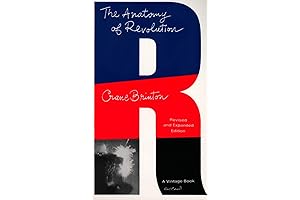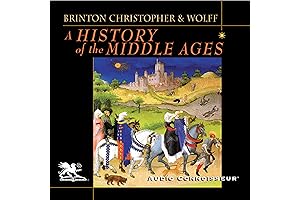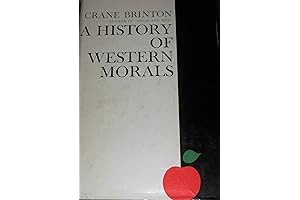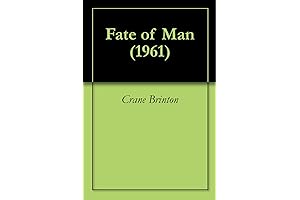· crane brinton · 8 min read
Crane Brinton | Most Renowned Books and Best Works
Crane Brinton, one of the 20th century's most influential historians, specialized in the history of ideas and the study of revolution. Learn more about his best works, including “The Anatomy of Revolution” and “A History of the Middle Ages.”
Crane Brinton, one of the 20th century's most influential historians, specialized in the history of ideas and the study of revolution. He was born in Winsted, Connecticut, in 1898, and studied at Harvard University and the University of Paris. After teaching at Harvard and other universities, he joined the faculty of the University of California, Berkeley, in 1947. He remained there until his retirement in 1967.
Overview

PROS
- Illuminating historical patterns of revolution
- Captivating case studies and thought-provoking analysis
CONS
- Somewhat dated in language and examples
Crane Brinton's seminal work, The Anatomy of Revolution, offers an in-depth exploration of revolutionary movements throughout history. Delving into case studies from diverse eras and regions, Brinton meticulously dissects the anatomy of revolutions, revealing their key characteristics and underlying dynamics. The book's thought-provoking analysis provides valuable insights into the causes, processes, and consequences of revolutions, making it an indispensable resource for students of history and political science.
Brinton's unique perspective and insights, gained from his extensive research and personal observations, enrich the reader's understanding of revolutions. His well-crafted prose and nuanced analysis offer a comprehensive examination of the complexities of revolutionary movements, unraveling their intricate patterns and providing a deeper understanding of their transformative impact on societies.

PROS
- Brinton's lucid writing style demystifies the complex medieval period, making it accessible to a wide audience.
- The revised edition incorporates recent scholarship and offers fresh insights into key historical events and figures.
- Brinton masterfully weaves together political, social, economic, and religious strands, providing a holistic view of the Middle Ages.
CONS
- Some readers may find the comprehensive nature of the book overwhelming, requiring a dedicated investment of time.
- The emphasis on Western Europe limits the exploration of medieval developments in other regions of the world.
Crane Brinton's 'A History of the Middle Ages: Revised Edition' is an authoritative and engaging account of this pivotal period in human history. Brinton's exceptional ability to synthesize vast amounts of information into a coherent narrative shines through, making the book an indispensable resource for students, scholars, and anyone seeking a deeper understanding of the Middle Ages.
The revised edition incorporates the latest research and scholarship, ensuring that readers have access to the most up-to-date information. Brinton's skillful use of primary sources and his ability to draw connections between seemingly disparate events create a compelling and thought-provoking narrative. While the book primarily focuses on Western Europe, it also acknowledges the broader global context, providing a well-rounded perspective on the era.

PROS
- Delves into the origins and development of Western moral principles, providing a comprehensive historical perspective.
- Presents a thought-provoking analysis of the interplay between moral beliefs, social structures, and historical events.
CONS
- Some sections may require a background in Western history to fully grasp the context.
- The focus on morality primarily through a historical lens may limit exploration of contemporary ethical issues.
Crane Brinton's 'A History of Western Morals' embarks on an intellectual journey that traces the evolution of moral values in the Western world. With meticulous attention to detail and a keen eye for historical context, Brinton unravels the intricate tapestry of moral beliefs that have shaped Western civilization.
Through the exploration of key historical periods and influential thinkers, Brinton masterfully dissects the interplay between morality, social structures, and major historical events. His analysis offers a profound understanding of how moral values have both driven and been shaped by the course of Western history. Brinton's work remains an indispensable resource for anyone seeking to grasp the complexities of Western morality, providing a solid foundation for further exploration of ethical issues both past and present.

PROS
- Captivating and in-depth account of Talleyrand's extraordinary life and career.
- Brinton's masterful storytelling brings the complexities of Talleyrand's character to life.
- Provides profound insights into the political and social dynamics of post-Revolutionary France.
CONS
- May be dense for casual readers.
- Some may find the focus on Talleyrand's political maneuvering excessive.
Crane Brinton's 'The Lives of Talleyrand' is a remarkable biography that delves into the enigmatic life of Charles-Maurice de Talleyrand-Périgord, a pivotal figure in French history. Written with impeccable detail and a deep understanding of the man, Brinton's masterpiece offers a captivating narrative of Talleyrand's journey through the tumultuous years of the French Revolution and beyond.
Brinton masterfully portrays Talleyrand's extraordinary diplomatic skills and political acumen, highlighting his role as a key player in shaping the course of European history. The book offers a penetrating analysis of Talleyrand's motivations and beliefs, revealing a complex and often contradictory character who managed to survive and thrive in a constantly shifting political landscape. Through personal anecdotes and meticulous research, Brinton unravels the intrigues and power dynamics that defined Talleyrand's life, providing an intimate glimpse into the mind of a diplomatic genius.

PROS
- Authentic and deeply moving depiction of the horrors of war
- Unflinching examination of the psychological toll on soldiers and civilians alike
- Exceptional performances from the entire cast, led by Sergei Bondarchuk's tour-de-force portrayal
CONS
- Some may find the film's runtime excessive
- Certain aspects of the plot can be predictable
Sergei Bondarchuk's epic masterpiece, 'Fate of Man (1961)', stands as a towering achievement in cinema, offering a profoundly moving and unflinching portrayal of the human condition amidst the horrors of war. Based on the renowned short story by renowned historian and philosopher Crane Brinton, the film follows the harrowing journey of Andrei Sokolov, a Soviet soldier captured by the Nazis and forced to endure unspeakable hardships.
Bondarchuk's direction is masterful, capturing the brutal realities of the Eastern Front with unflinching honesty. The film's haunting cinematography and evocative score create an immersive experience that draws viewers into the depths of Sokolov's harrowing struggle. The performances by the entire cast are nothing short of extraordinary, with Sergei Bondarchuk delivering a tour-de-force performance that captures the indomitable spirit and resilience of the human heart in the face of unimaginable adversity.
Brinton's work is characterized by its clarity, wit, and erudition. He was a master of the historical essay, and his books are still widely read today. In “The Anatomy of Revolution” (1938), Brinton argues that revolutions are not simply the result of economic or social forces, but also of psychological factors. He identifies four stages of revolution: the ancien régime, the revolutionary crisis, the Reign of Terror, and the Thermidorian Reaction. In “A History of the Middle Ages” (1930), Brinton provides a comprehensive overview of the period from the fall of the Roman Empire to the Renaissance. He argues that the Middle Ages were not a time of darkness and decline, but rather a period of great creativity and innovation. Brinton's other works include “A history of Western morals” (1959), “The Lives of Talleyrand” (1936), and “Fate of Man (1961). He died in 1968.
Frequently Asked Questions
What is Crane Brinton famous for?
Crane Brinton is famous for his work as a historian, specializing in the history of ideas and the study of revolution.
When was Crane Brinton born?
Crane Brinton was born in 1898.
Where did Crane Brinton teach?
Crane Brinton taught at Harvard University, the University of California, Berkeley, and other universities.
What are some of Crane Brinton's most famous works?
Some of Crane Brinton's most famous works include “The Anatomy of Revolution” and “A History of the Middle Ages.”
When did Crane Brinton die?
Crane Brinton died in 1968.








